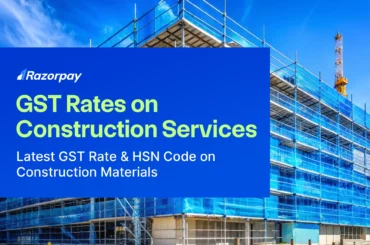Table of Contents
Introduction of GST on Online Gaming
The online gaming industry in India has seen significant growth, driven by widespread smartphone usage, affordable internet, and a young population. This sector includes casual games, e-sports, fantasy sports, and real-money gaming, attracting millions of users. The Indian government has implemented significant changes in the taxation of online gaming, casinos, and lottery under the Goods and Services Tax (GST) regime.
GST Rate for Online Gaming
A uniform GST rate of 28% is applicable to online gaming including casinos and lottery, effective October 1, 2023. The tax is levied on the full face value of bets, stakes, or entry fees.
This revised GST framework removes the distinction between games of skill and chance, streamlining the tax structure for the industry.
GST Rate on Games of Skill
Games of skill require mental or physical exertion and strategic decision-making.
Traditionally, games of skill were exempt from GST as they were not considered a supply of goods or services. However, recent recommendations by the GST Council propose a 28% GST on the full face value of the contest entry amount (CEA).
GST on Games of Chance
Games of chance primarily rely on luck or random events, with minimal skill involved.
These games, including lottery, betting, and gambling, are subject to a 28% GST on the full face value of the CEA as per the GST Council’s decision.
GST on Lottery
GST on lottery is classified into two rates, 12% and 28% GST. Here is the breakdown
- 12% GST: Applies to lotteries run by state governments and sold within the same state.
- 28% GST: Applies to lotteries authorized by state governments but sold outside the organizing state.
- Lottery tickets are considered goods: Despite being an actionable claim, lottery tickets are classified as goods under the GST Act.
- Two GST rates: There are two different GST rates applicable to lotteries:
- Taxable value: The higher of the face value of the ticket or the price notified by the state government is considered the taxable value for GST calculation.
Tax Implications and Compliance
The GST framework for online gaming involves several key components:
- GST on Platform Fees: A standard 18% GST is applicable on platform fees charged by gaming intermediaries.
- GST on Prize Money: While the prize money itself is exempt from GST, the platform’s services related to managing and distributing the prize pool might attract GST.
- TDS on Winnings: The recent introduction of TDS on net winnings adds a new layer of compliance for gaming platforms.
- Record Keeping: Maintaining detailed records of deposits, withdrawals, and game transactions is crucial for GST compliance.
How to Calculate GST on Online Gaming and Casinos?
Online gaming platforms earn revenue in two primary ways:
- Platform Fee: A percentage of the entry fee (usually 10-20%) charged to players.
- Prize Pool: The remaining amount set aside for distribution as winnings.
Under the updated GST framework, a 28% GST rate applies to the full value of bets or entry fees.
Example Calculation:
Suppose 10 players each contribute ₹500 to participate in a game.
- Total Bet Amount: ₹500 × 10 = ₹5,000
- GST Calculation: ₹5,000 × 28% = ₹1,400
The platform will charge ₹1,400 as GST, making the total contribution per player ₹640 (₹500 + ₹140 GST).
For casinos, horse racing, or lottery, the same rule applies, ensuring GST is calculated on the total face value of the bet.
Evolution of GST Regulations on Online Gaming
The evolution of GST on online gaming in India has seen several developments over the years. Initially, the differentiation between games of skill and games of chance played a crucial role in the taxation framework.
Pre-GST Era
Before the implementation of GST, the taxation of online gaming was governed by state laws and varied significantly across different states. The primary distinction was between games of skill, which were generally considered as legal and taxed at lower rates, and games of chance, which were often equated with gambling and subjected to higher taxes or outright bans.
Post-GST Era
With the introduction of GST in July 2017, the tax regime aimed to create a uniform tax structure across the country. However, the complexity of the online gaming industry necessitated further clarity and specific regulations:
- 35th GST Council Meeting (June 2019): It was recommended that issues related to the rate and valuation of casinos, horse racing, and online gaming be referred to the Fitment/Law Committee.
- 37th GST Council Meeting (September 2019): The Fitment Committee recommended taxing gross gaming revenue (GGR), but the recommendation was deferred.
- 38th GST Council Meeting (December 2019): The pending matters related to taxation of casinos, horse racing, and online gaming were referred to the Fitment/Law Committee.
- May 2021: The GST Council constituted a Group of Ministers (GoM) to examine whether any change in legal provisions was required for the valuation of services provided by online gaming, race courses, and casinos.
- June 2022 (47th GST Council Meeting): The GoM submitted its report, recommending a 28% GST on the CEA. The GST Council requested the GoM to reassess the issue.
- December 2022 (48th GST Council Meeting) and February 2023 (49th GST Council Meeting): Discussions on online gaming, race courses, and casinos were not taken up.
- April 2023: The Ministry of Electronics and Information Technology (MeitY) amended the IT Rules (Intermediary Guidelines and Digital Media Ethics Code), 2021, related to online gaming.
- July 2023 (50th GST Council Meeting): In its 50th meeting in July 2023, the GST Council decided to impose a 28% tax—the highest slab—on the full face value of online gaming, aligning it with the taxation of casinos and horse racing. The Council also ruled out any distinction between ‘games of skill’ and ‘games of chance.’
The historical context highlights the evolving regulatory landscape and the ongoing efforts to establish a clear and fair taxation framework for the online gaming industry in India
Related Reads:
Impact of GST on GST Gaming on Different Stakeholders
1. Impact on Online Gaming Operators
- Increased Compliance Requirements: Online gaming operators need to comply with detailed record-keeping and periodic GST filings.
- Cost of GST Compliance: The introduction of GST brings additional compliance costs, including the need for specialized accounting software and professional services.
- Tax Rate Considerations: Operators are subject to the standard GST rate of 28% on the total bet value, increasing the overall tax burden.
- Competitive Pricing: The need to absorb or pass on the GST burden affects the pricing of gaming services, potentially impacting competitiveness.
2. Impact on Players
- Increased Cost of Participation: Players may experience higher costs to participate in online gaming as operators pass on the GST burden.
- Potential for Reduced Payouts: Higher tax rates might lead to reduced prize pools or winnings as operators adjust to the new tax regime.
- Awareness and Compliance: Players need to be aware of the GST implications on their winnings and any required compliance, such as the deduction of GST at source.
3. Impact on Government Revenue
- Increased Tax Collection: The inclusion of online gaming under GST is expected to boost government revenue through higher tax collections.
- Regulation and Monitoring: Enhanced regulation and monitoring of the online gaming industry can lead to more efficient tax enforcement and reduced tax evasion.
- Broadening the Tax Base: Taxing online gaming helps broaden the tax base, capturing revenue from a rapidly growing industry segment.
4. Impact on Industry Growth
- Market Dynamics: The GST impact may influence market dynamics, including the entry of new players and the sustainability of existing operators.
- Innovation and Adaptation: The industry might see increased innovation as operators adapt to the new tax landscape and seek ways to mitigate the impact of GST.
- Regulatory Clarity: Clear guidelines and regulations can help the industry navigate the GST regime, fostering growth and stability.
Related Read: GST on Insurance Premium
Challenges and Opportunities
The online gaming industry faces several challenges due to the evolving GST landscape:
- Classification Disputes: Determining whether a game is skill-based or chance-based can lead to disputes.
- Compliance Burden: Adhering to complex GST regulations and record-keeping requirements.
- Impact on User Behavior: The higher GST rates might influence user spending and platform usage.
The industry also presents opportunities for growth and innovation. By understanding the GST framework and implementing robust compliance measures, online gaming companies can navigate the complexities and thrive in the market.
Conclusion
Navigating the GST framework for online gaming requires a deep understanding of its complexities, as it directly impacts compliance, financial planning, and overall business strategy. With evolving regulations and the distinction between skill-based and chance-based games, staying informed is essential for operators and players alike to successfully manage the associated challenges and opportunities in this dynamic industry.
Frequently Asked Questions
1. Is online gaming taxable in India?
Yes, online gaming is taxable in India. The GST Council has classified online games as ‘actionable claims’ and levied a 28% GST on the full value of the consideration or fee charged from the player.
2. Are E-sports and Online Games Taxed Differently?
Currently, e-sports and online games are taxed uniformly under the GST regime. Both are subject to a 28% GST rate. However, there have been discussions about potentially differentiating between games of skill and chance, which could lead to different tax treatments in the future.
3. What is the HSN Code for Online Gaming?
The HSN (Harmonized System of Nomenclature) code for online gaming services in India is 998439. This code is used for identifying goods and services for taxation purposes.
4. Are all online games subject to GST?
Yes, all online games that involve a fee or consideration are subject to GST. This includes games of skill, chance, or a combination of both.
5. Does GST apply to all casino games?
Yes, all casino games, whether online or offline, are subject to GST. The specific GST rate applicable to casino games depends on the nature of the game and the state where it is operated.
6. What are the penalties for non-compliance with GST regulations in the online gaming sector?
Non-compliance with GST regulations in the online gaming sector can lead to various penalties, including:
- Late fee: A penalty for delayed or non-payment of GST.
- Interest: Interest charged on the unpaid GST amount.
- Cancellation of registration: In severe cases, the GST registration of the online gaming business may be canceled.
- Legal action: The tax authorities may initiate legal proceedings against non-compliant businesses.


